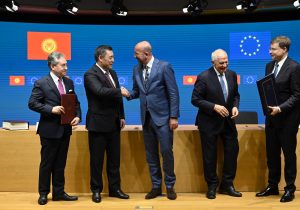Five years after concluding negotiations and initialing a draft Enhanced Partnership and Cooperation Agreement (EPCA), Kyrgyzstan and the European Union signed the agreement in Brussels.
The EPCA was signed on June 25, 2024, during a working visit of Kyrgyz President Sadyr Japarov to Brussels, and replaces the 1999 Partnership and Cooperation Agreement (PCA) that previously provided the basis for EU-Kyrgyzstan relations.
High Representative of the European Union for Foreign Affairs and Security Policy and Vice-President of the European Commission Josep Borrell said, “We are happy to count the Kyrgyz Republic amongst our close partners.” He characterized the EPCA as demonstrating the EU’s “steadfast commitment to strengthening and deepening our bilateral relations based on shared values and common interests in all areas of mutual benefit, reflecting new geopolitical and economic realities.”
Borrell said that the EU would, “continue working with Kyrgyzstan on further strengthening the protection of human rights and fundamental freedoms and promote cooperation with civil society which are essential pillars of an open democratic society.”
In April, Kyrgyzstan adopted a controversial “foreign representatives” bill that subjects non-governmental organizations (NGOs) that receive foreign funding to additional reporting and auditing requirements and labels them as “foreign representatives.” Ahead of the bill being signed into law by Japarov, the European Union delegation in Kyrgyzstan signed onto a joint statement alongside the embassies of Canada, France, Germany, the United Kingdom, and the United States in Kyrgyzstan expressing concern over the law. The law’s provisions, the statement noted, “threaten the ability of non-profits and non-governmental organizations (NGOs) to operate freely, contravene international norms, and jeopardize our ability to provide assistance that improves the lives of the citizens and residents of the Kyrgyz Republic.”
The law came to epitomize Kyrgyzstan’s democratic backsliding, which has seen the country’s authorities crack down on journalists and tighten the space in which civil society operates. Its passage didn’t seem to hamper the EPCA signing, however. A factsheet on the agreement stated that ”the EU and the Kyrgyz Republic will strengthen the promotion of human rights and fundamental freedoms, respect for democratic principles, the rule of law and good governance, as well as the development of parliamentary democracy.” Precisely how is not explained in the factsheet.
EU Executive Vice-President and Commissioner for Trade Valdis Dombrovskis said in regard to the signing that it “marks a new chapter in the EU’s economic and trade relations with Kyrgyzstan.” He highlighted its “ambitious” trade and sustainable development chapter. Trade issues, particularly those relating back to Russia and its war in Ukraine, are a clear motivation for cementing firmer ties with Kyrgyzstan regardless of its recent backsliding.
The abovementioned factsheet stated that the “Kyrgyz Republic continues preventing the circumvention of EU sanctions against Russia, inspiring further trust for EU-Kyrgyz trade.”
In June 2023, RFE/RL reported on how Kyrgyz and Kazakh companies had continued to export sanctioned dual-use technology to Russian suppliers; a handful of Kyrgyz companies have been sanctioned by the U.S. for circumventing sanctions on Russia, and last week a Kyrgyz company was among those targeted in the EU’s 14th round of sanctions against Russia.
Beyond human rights and democracy, and trade, the EPCA contains sections covering education, environment and climate change, energy, and transport. The present geopolitical moment – with the resurgence of Russia as a threat to Europe – has in some ways deepened the EU’s interest in Central Asia. But it’s worth noting that the EU adopted a new Central Asia strategy back in 2019, sustaining the argument that Europe’s regional interests are not a new fad but can perhaps be understood as an evolution in light of present global trends.
The EU and Kyrgyzstan began negotiations on the EPCA back in 2017 and concluded those negotiations in July 2019. But the final signing of the agreement was postponed beyond the end of 2019 and thereafter seemed lost in the miasma of pandemic and revolution-ridden 2020.
Kyrgyzstan is the second Central Asian state to sign an EPCA. Kazakhstan’s EPCA with the EU was signed back in 2015 but didn’t enter into full force until March 2020, after all EU member states had ratified it (this will be one aspect to watch with regard to Kyrgyzstan’s EPCA, too). Uzbekistan, meanwhile, completed negotiations with the EU in July 2022 on an EPCA and in January 2024 was reported as “eager” to speed up signing – no word yet on when that may be.

































